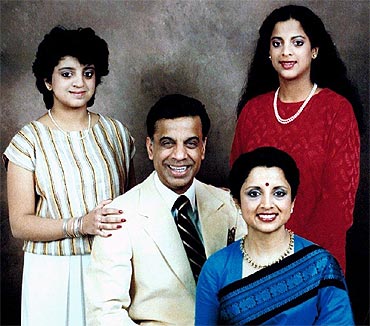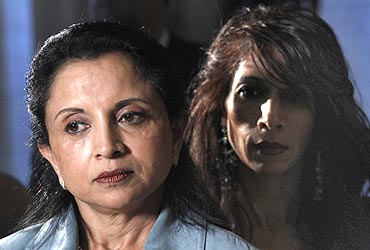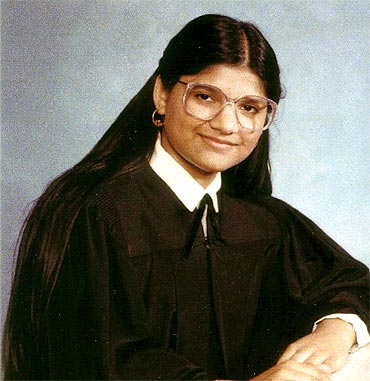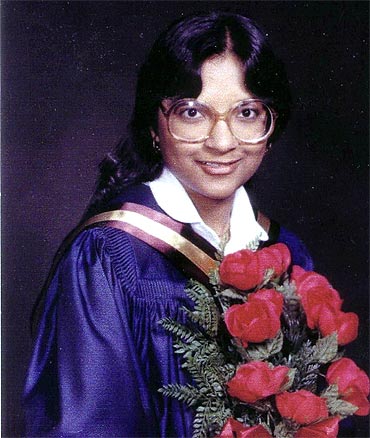
On June 18, Justice John Major released a scathing report on the 1985 Air India Kanishka bombing investigation, terming it an 'Air India, Canadian atrocity'. The report criticised Candian authorities for ignoring warnings about a likely terror strike on the aircraft and lapses in subsequent investigations.
Justice Major also said that the families of the victims, in some ways, have often been treated as adversaries, 'as if they had somehow brought this calamity upon themselves'.
Rediff.com's Ajit Jain talks to those who lost their loved ones to the terror strike 25 years ago, and finds that the report has brought barely any closure for them.
For Lata Pada, who lost her husband Vishnu and two daughters Brinda and Arti in the 1985 Air India bombing, the last 25 years have been very long. Irish divers recovered her daughters' bodies. Vishnu's body was never found.
To Pada, Justice John Major's report is "of critical significance in the light of the fact that globally we are facing such a rise of fundamentalist ideology and acts of terrorism."
"It has been an extremely excruciating and emotionally draining experience to stay engaged, to stay committed to this inquiry," she said.
"This report can serve as a very useful tool for the world -- how we can safeguard our citizens from terrorism by implementing the right policies, the right legislations, the right security measures; the way we function as a society, whether it is security, whether it is intelligence, surveillance, whether it is the judicial system, whether it is our immigration policies."
She was in Mumbai on June 23, 1985, when she heard the news of the bombing. "I had gone to India two weeks earlier to prepare for a performance," she said. "Vishnu and my daughters were to reach Mumbai and we were all supposed to go to Bengaluru, our home city. I was in rehearsals when I got the news. My first reaction was it can't be true. I thought there was an accident, but there would be survivors Of course, they (my family members) are alive You don't imagine that the coming down of an aircraft could be as devastating as in the case of the Air India tragedy. Terrorism didn't even enter my mind at that time; 25 years ago, terrorism was not what it is today."
Pada said her younger sister Geetha Rao, who was working for Air India then, and Rao's husband were with her when they went to Cork, Ireland, to get the bodies.
"I went through all the phases of coping with a tragedy," Pada said. "There was disbelief; there was denial; there was terrible rage against those who perpetrated it; terrible disappointment that Canada could have allowed something like this to happen. Then I became resigned to the fact that this was the destiny of those who were on that flight. I immersed myself in my dance. It seemed to be the only way I could cope."
Pada, a Bharat Natyam dancer, choreographer and teacher, heads the Sampradaya Dance Academy and Sampradaya Dance Creations, Mississauga. Last year, she received the Order of Canada.
 |

"My daughters were 18 and 15," she said. "To imagine what it could have been at this stage is difficult. They could have been in their 40s and I could have been a grandmother; my life would have been so different." Vishnu was 46.
Over the last 25 years, Pada has been at the forefront of the fight for justice and has become the face of the victims' families.
There was huge amount of stonewalling on part of the government to institute a public inquiry into this tragedy. It argued that the criminal investigation was still on. "We had no choice but to accept that. But the moment the trial of (the accused) Ajaib Singh Bagri and Ripudaman Singh Malik ended (in their acquittals in 2005), we were re-energized. Nothing could stop us from having an inquiry," Pada said.
"I have come to the end of this chapter in my life," she added. "I don't think Canada can afford to think it is shielded of being impervious to the acts of terrorism. I think Canadians know that we are part of this world and anything that triggers in another part of the world can come to our own soil. Today, we are in a different world order."
"Terrorism has become part of our lives. The first thing we do when something goes wrong is speculate if it was terrorism. When a plane goes down in any part of the world these days, the first thing that the media is committed to knowing is if it was an act of terrorism," she said.
Pada added, "The report is the only vehicle for lasting changes to be made in the ways that we function as a nation, whether it is the Royal Canadian Mounted Police or the Canadian Security Intelligence Service, whether it is the institutions that collect money for terrorist activities under the guise of being charities, or how the judicial system can deal with such acts."
 |

Deepak Khandelwal, who was 17 at that time, was booked on the Air India flight that was bombed on June 23, 1985. A scholarship letter that day saved him. His sisters Manju, 19, and Chandra, 21, however, boarded the Kanishka Boeing 747.
"One of the most painful things for us at that time was that we were all in different locations," said Khandelwal, who works with Google in Toronto. "My mother was in India for the wedding of one of our uncles. My dad was in Saskatoon (in canada). I was booked on the same flight, but changed plans at the last minute because of the scholarship to a programme at the University of Calgary. I left the same night for Calgary after dropping my sisters at the airport. I was alone in Calgary when the news came. I came to Saskatoon the next morning. My father and I went to Ireland to identify the bodies. We found Manju's body after four to five days of the tragedy. Then we went to India to connect with my mom."
"The last 25 years have been difficult for the family," he added. "The anniversary is especially difficult, as it brings back a lot of memories. I don't think they (his parents) can ever forget; they think about them every day, but you try to move on."
 |

The family was disappointed by the way Canada dealt with the bombing. "I believe the Canadian system was not prepared to deal with the tragedy of this magnitude," Khandelwal said.
"Nobody wanted to be accountable for what happened, so they used delaying tactics. It got harder and harder to find out what really happened and for the government to admit that there was a bomb in the plane, which is still very frustrating for the families. I hope the government and its agencies have learnt from their mistakes and make changes that will prevent future tragedies," he said.
Khandelwal feels that the Air India inquiry report has brought no closure. "We live every day with the pain of losing our loved ones," Khandelwal added. "Nothing is going to bring back our loved ones. I don't believe people who were responsible for this will ever be held accountable. So, let us do whatever we can to prevent this from happening to other families and ensuring that they don't go through what we have gone through in the last 25 years."
 |